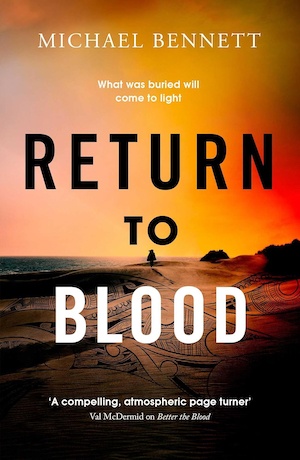
In his debut novel, Better the Blood, New Zealand crime author Michael Bennett explored the wounds and after effects of colonialism and picked up the Ngaio Marsh Award for Best First Novel. In this sequel, Hana Westerman, a Māori detective in the Auckland Crime Investigation Branch, returns to take on both her own and society’s challenges.
Six months have passed since the traumatic incident that concluded Better the Blood. Hana has left the police and returned to her home town to live with her father. In the small coastal village of Tātā Bay, Hana’s life consists of teaching teenagers to drive and conducting insurance investigations. Despite leaving her police career behind, Hana continues to be drawn to crime and the dangers that come with it.
During a family outing to the beach, Addison, Hana’s 18-year-old daughter, makes a grisly discovery. She finds the buried remains of a woman. Hana is instantly reminded of a high school classmate who was killed and buried in the dunes 21 years ago. A Māori man and ex-gang member was found guilty of the crime and died in prison. Two women of the same age found in the same location… Are they linked? Was the wrong man convicted?
The body is identified as Kiri Thomas, a young Māori woman with a history of drug addiction who disappeared four years earlier. It is evident from the wounds on her wrists and ankles that she did not die of natural causes.
Two of Hana’s ex-colleagues – including Jaye, her daughter Addison’s father – are dispatched from Auckland to assist with the case. Hana inevitably becomes involved, as does Addison, who is drawn to Kiri’s story because she discovered her body. The team from Auckland CIB investigate every possible lead in both cases, interviewing parents, witnesses and suspects. Hana, on the other hand, goes rogue and suffers the consequences.
There are three narratives that unravel the murdered woman’s story – those of Hana, Kiri and Gordon, a suspect. Hana’s story focuses not only on the progress of the murder investigation, but also on her relationships – whether with Addison and her non-binary partner, with her ageing father, or the complex one she has with Addison’s father, Jaye. Hana is also struggling to be accepted back into a community that distrusts her because she used to be a cop. In contrast, Gordon’s story reveals the disturbed mind of a person whose behaviour raises suspicion and who fits the profile of a serial killer. Yet, the police are unable to gather sufficient evidence to convict him.
But what really captures our attention is the voice of the murdered young woman retelling the events leading to her untimely death even though she never hints at or reveals who the murderer is. Kiri’s story begins with the novel’s first sentence: “I’ll start with that night,” she says and in an instant we’re hooked. Her account of her relationship with her boyfriend and the days leading up to her death is eerily honest, cutting right to the bone, and it leaves a lingering feeling of unease. She knows she’ll be dead seven days later and this knowledge also turns us into voyeurs.
Relationships and how social circumstances shape them are very much at play in Return to Blood. For example, Kiri was adopted after her biological parents died when she was a child, but despite being raised in a loving family, she nonetheless became involved in drugs, crime and prostitution. Hers is not a typical story of abuse or parental neglect. Bennett demonstrates through his characters that assumptions should not be made based on upbringing or cultural background.
Addison and her partner’s relationship also raises the issue of how to approach gender roles and use pronouns. Even though this fits in with our current zeitgeist it doesn’t feel forced or added just for the sake of being politically correct. Bennett subtly emphasises it through conversations between Addison, her grandfather and her partner about their sexuality.
Return to Blood improves on its predecessor. In comparison, the emphasis this time around is less on social inequality, discrimination and racism and more on relationships within families, communities and cultures, which often overlap. Bennett delivers a straightforward crime story that is well-structured and leaner than his debut.
Following the acclaim for Better the Blood, expectations are understandably high and Bennett does not disappoint. On the contrary, I found this second foray into Hana Westerman’s life to be more enjoyable than the first.
Also see The Gone, a New Zealand television crime series which Michael Bennett helped write and develop.
Simon & Schuster
Print/Kindle/iBook
£9.99
CFL Rating: 4 Stars